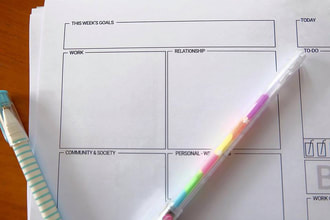|
Well, that's another Christmas over with! I hope you had a lovely time - I spent mine catching up with friends and family, eating far too much chocolate, and watching my rugby team lose our Boxing Day match (better luck next year!) This is the time of year when people inevitably start to take stock of their lives, and ask themselves questions about the year ahead. What will it be like? Will I finally do the things I want to do? Will I be happier, healthier, cooler, smarter? Sorry to disappoint, but the answer is, um...probably not. The title of this blog might seem a little bleak, but read this post before setting yourself any resolutions - it won't help you achieve them (you've got to put the effort in for that!) but it might help you stick to them. According to this chart, the most common resolutions for 2018 were things like "eat healthier," "get more exercise," "save (more) money" and "get more sleep." So far, so good, right? I'd quite like all of those things myself! The problem is, by the second Friday in January, most people will have given up on their resolutions. I get it, January is cold and rainy and miserable, and probably not the best time to be setting resolutions all things considered. But we have to start somewhere - the question is, how can we make sure that we last longer than two weeks?  We all have the best of intentions but somewhere along the way, life tends to derail us. We often think that this just happens, but there's usually something quite specific happening that stops us from achieving the things we want to. It starts before we set our resolution, and continues as we make progress towards our goal. So, thinking about resolutions you've set before, let's have a think about what might have gone wrong for you in the past: Your resolution wasn't SMART enough Looking back up the page, those resolutions like "eat healthier" and "get more sleep" are just not clear enough. How do you know what "healthier" is? How much more sleep is enough? Setting yourself goals in a particular way can help you to really think about what it is you want to achieve. Most people have heard of the mnemonic SMART when it comes to goal setting. Generally, to set a goal it needs to be:
You didn't build in rewards along the way Let's be honest for a moment here. It doesn't matter what your resolution is, there will be days when you just don't want to think about it. It's raining and you need to go for a walk, or you forgot your reusable bottle and the single-use plastic one is right there, or you're stressed and you need a takeaway. If the whole resolution feels like one long punishment, even if it's something that you feel is overall rewarding/useful to you, it can be much harder to stick to. Building in rewards every few days, once a week, or every month can be a really good way of keeping on track. Think about what would feel rewarding to you, and then make sure you take the time to actually do it: buy yourself a cup of coffee if you hit your running mileage for the week; watch three episodes of your favourite show in a row if you hit your savings target. The only catch - make sure your reward doesn't undermine your resolution, e.g. don't reward yourself for sticking to a savings goal by buying something you don't really need.  You didn't factor in failure As I've already said, we all have the best of intentions when we set resolutions. We don't like to think about the idea that we might fail in achieving our goal, and we talk a lot about what will happen when we do get to where we want to be. But failure is a part of change, and if we ignore that it makes it more likely that we will lose sight of our goal. I often talk to people about setting goals, and one of the questions I ask is, "what are you going to do when you fail?" I mean, what happens when you have a bad day and you don't hit the target you've set for yourself, when you eat the chocolate you didn't want to eat, when you avoid going to the party rather than putting yourself out there? Most people don't want to think about that, but if you think about it you can plan for it and it ceases to become "the end" of your resolution. The way you think about this likely failure can make or break your resolution in the long run. If you eat the chocolate and think "that's it, my resolution is ruined!" then you're likely to stop doing all the things you have been doing up to that point. If you can think "we planned for this, I'm going to start again tomorrow," it makes it much easier to stick to your goal longer-term. Nothing worthwhile can be done overnight, and failure/relapse/going back to old habits is common. What happens when you get there determines whether you'll stick to your resolution or go back to the place you hated being in when it was 11pm on the 31st of December. There are lots more things that might make it difficult to keep to your resolution, but if it's SMART, rewarding along the way, and you keep an eye out for failure, you're most of the way there. I'm sure I'll write more in future about goal-setting - let me know what you'd like to know about in the comments. I hope you all have a lovely new year, and I'll see you in January!
0 Comments
Leave a Reply. |
AuthorDr Sarah Blackshaw: Clinical Psychologist, blogger, tea drinker, interested in dinosaurs and shiny objects Archives
January 2024
Categories
All
|
Photos from wuestenigel (CC BY 2.0), Ivan Radic (CC BY 2.0), Marco Verch (CC BY 2.0), John Brighenti, wuestenigel, simplicityhunter, Anarchimedia, Find Rehab Centers, wuestenigel, Ivan Radic, Army Medicine, kennethkonica, smallcurio, Jasmic, wuestenigel, JoanDragonfly, BrightStarPhoto21, popofatticus, wuestenigel, forthwithlife, kurotango Clip, ⍘dotism⍘, Tambako the Jaguar, One Click Group UK, Rawpixel Ltd, Blue Mountains Library, wuestenigel, mattbuck4950, h.koppdelaney, verchmarco, The Mom With a Camera, cloudplanner, wuestenigel, verchmarco, OIST (Okinawa Institute of Science and Technology), stevendepolo, juliejordanscott
 RSS Feed
RSS Feed